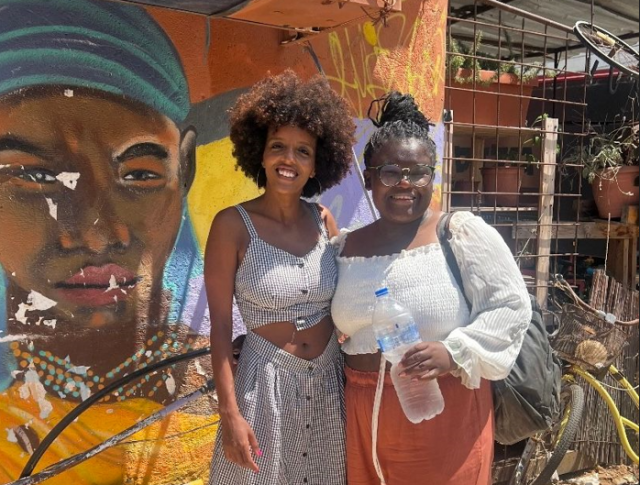
By Kiara Dunlap
For The Birmingham Times
As I embarked on my journey to Israel this summer, little did I anticipate the profound encounters awaiting me.
The stories of Ethiopian Jews often remain untold, eclipsed by the broader Israeli and Jewish narratives. However, my time in Israel gave me a deeper perspective on the history, the remarkable journey and the challenges this unique community has faced.
My initial entry into this vibrant community began at an absorption center, where I had the privilege of meeting resilient members of the Ethiopian community. I was struck by the fact that visitors from non-white backgrounds, such as our group of young Black leaders from the U.S., are a rarity. In fact, it was an honor being among the few Black visitors whom they’ve had the chance to welcome.
The purpose of an absorption center is to help immigrants transition into Israeli life. It is a complex process, involving language, employment, identifying within the broader Israeli culture and embarking on a new journey.
In one single moment – our moment of arrival — a connection emerged between their community and our group. Instinctively, we all knew that it was based on the shared experience of being minorities in our respective countries, unable to conceal that which distinguishes us from the broader culture. It was deeply moving and profound and something I never expected.
The visit with the Ethiopian community was a highlight of the trip that I took through an Atlanta-based organization, Philos Black, which provides young African-American leaders the opportunity to visit Israel.
Awe And Curiosity
The children at the absorption center greeted us with a mixture of awe and curiosity, mirroring the fascination we held for them. Until then, our exposure had primarily been to White Jews, akin to the Jewish people I have met in Birmingham during my internship with the Southern Jewish Life Magazine and The Birmingham Times.
Their search for identity within Israeli culture – and especially Israeli history – was dramatized to us after a poignant visit to Yad Vashem, Israel’s memorial to the Holocaust, which focuses on the death and destruction of 6,000,000 European Jews.
Immediately after our Yad Vashem experience, we visited a memorial site dedicated to those Jews from Ethiopia who died trying to reach Israel, often walking on foot through the Sudan facing marauders, wild animals and starvation.
We also journeyed to an Ethiopian Israeli heritage cultural center run by a remarkable activist, Ashager Araro. She was one of the babies born during Operation Solomon, a well-known effort by Israel to bring large numbers of Ethiopians who wanted to immigrate.
As a first-generation Israeli in her family, she conveyed the challenge of finding her place between her Israeli classmates and her Ethiopian family. Her journey of embracing her differences and discovering strength in her distinctiveness struck a resemblance to me.
Growing up in a Black family in a white-centered world, attending a mostly White high school and moving from California to Alabama, I, too, have searched for my place and could relate to much of what she was saying.
As I look back on my trip, my encounters with Ethiopian Jews in Israel have enriched my understanding of Israel’s diverse tapestry – as well as its challenges. The Ethiopian saga, not always widely known and rarely center stage, is powerful and inspiring. And it embraces the essence of unity within diversity.
Heroic Journey
At the Ethiopian site, our group was guided by the esteemed Ethiopian Jewish actor and director Shai Fredo. Shai’s poignant account resonated deeply as he pointed out his grandfather’s name on the memorial site dedicated to those Jews from Ethiopia who died trying to reach Israel.
His recollections of life and his heritage in Ethiopia, along with the heroic journey his family undertook to reach Israel, left an indelible impression on the group. Despite the challenges he faced upon arriving in Israel as a young boy, Shai’s love for the country and his pride in his Israeli identity shined through.
He also talked about the racism that Ethiopians have encountered in Israel. He attributed this to ignorance among Israelis and lack of familiarity with the Ethiopian community. His commitment to sharing his narrative with anyone willing to listen underscores his determination to counter misconceptions other Israelis may have about Ethiopians.
Having been part of an artist-in-residence program at Clark Atlanta University, an esteemed HBCU (Historically Black College and University), Shai’s appreciation for that opportunity in this unique educational setting resonated deeply with him. He said that being in an HBCU environment was “liberating” and he sought the chance, in part, because it was geared to a minority community.
Kiara Dunlap, a recent graduate of Miles College, interned jointly with the Birmingham Times and Southern Jewish Life magazine. She focuses on stories of interest in the Black and Jewish communities.
Updated at 3:53 p.m. on 8/28/2023 with additional information.




